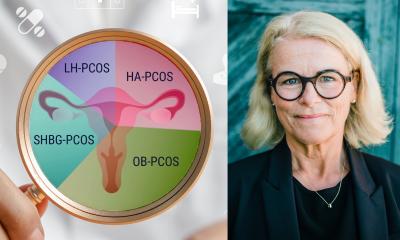News • Underdiagnosis of gestational condition
Over half of pregnant women unaware of diabetes, study suggests
Research investigating testing methods for gestational diabetes suggests that over half of pregnant women with the condition are not being diagnosed with the current NHS blood test process, leading to unnecessary complications for mother and baby.

Image source: University of Leicester
The study, carried out by Professor Claire Meek of the University of Leicester, and colleagues at the University of Cambridge with funding from the National Institute of Health and Care Research (NIHR) found that processing the blood sugar test of mothers at risk of gestational diabetes more quickly could lead to more accurate diagnosis of this serious condition. The findings have been published in the journal Diabetic Medicine.
Professor of Chemical Pathology and Diabetes in Pregnancy, Claire Meek said: “Gestational diabetes, which affects women in pregnancy, is very common in the UK and causes complications at the time of birth, affecting both mother and child. Fortunately, most complications can be prevented by accurate diagnosis and access to treatment. However, if the diagnosis is not accurate, then affected mothers cannot access the treatment they need.”
Gestational diabetes is diagnosed using an oral glucose tolerance test (OGTT) around 24 to 28 weeks of pregnancy. This test involves taking the mother’s blood before they consume a sugary drink. A further sample is taken and tested two hours later. However, red blood cells in the sample continue to use up glucose after the blood is taken, so glucose concentrations fall over time in the sample tube, leading to an inaccurate result.

© CLIPAREA.com – stock.adobe.com
Processing the blood quickly means that the glucose levels in the sample are most similar to the glucose levels in the patient’s blood. “We wanted to assess if processing the samples more quickly improved the accuracy of the OGTT test.” continued Professor Meek. “We compared standard NHS sample processing procedures to an enhanced processing plan, where the blood was processed more quickly.”
Using standard NHS sample processing procedures, 9% of women in the study were diagnosed with the condition. The researchers found that when blood was processed more quickly, 22% of women in the study were found to have gestational diabetes. This means that 13% of women were missed with the standard test. More than half the women they found to have gestational diabetes in the study would have gone undiagnosed. Scaling this up, this could affect around 28,000-30,000 pregnant women every year in the UK.
Danielle Jones, the PhD student who coordinated the research project added: “Faster blood processing identified additional women with raised blood sugar levels that were missed by the standard test. Thirty seven percent of these women went on to have large babies – a complication which could have been prevented if undiagnosed women had access to treatment.”
The data from this study suggests that improving NHS sample processing is vital to improve gestational diabetes diagnosis. Access to treatment may also help prevent babies from growing too large. Processing blood more quickly (within 2 to 4 hours) is achievable in most NHS settings and offers new opportunities to improve the health of mothers and babies.
Source: University of Leicester
19.12.2024





